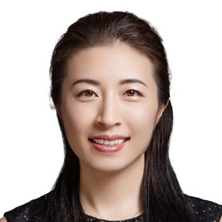
Shuyan Zhang
Dean of CEAM
Centre of Excellence for Advanced Materials, China
Biography: Shuyan Zhang is the Dean of Centre of Excellence for Advanced Materials (CEAM). Dr. Zhang received her Ph.D. degree in Engineering Science from Oxford and returned to China in March 2016 and founded CEAM with her team, aiming to shape CEAM into China’s leading service platform for advanced manufacturing. She assumes other important roles like GDPPC Representative, GDYF Vice President, member of MECASENS International Science & Technology Advisory Board, and member of National Residual Stress Academic Committee of China, etc. She was recognized as leader of “The Introduced Innovative and Entrepreneurial Team” by Pearl River Talent Recruitment Program of Guangdong Province, and winner of “The Funds for Distinguished Young Scientists” by Natural Science Foundation of Guangdong Province. She was also granted The 22nd Guangdong Youth May Fourth Medal, the 2021 Award for Promoting Industry-Academia-Research Institutes Collaborations, the CAPD Central Committee “Distinguished Contributor in Building a Moderately Prosperous Society in All Respects”.
Dr. Zhang’s research is focused on analysis of engineering materials’ residual stresses and micro mechanical properties using neutron and X-ray diffraction. Drawing on her rich experience, an engineering materials diffractometer has been developed and improved at both ISIS in the UK and CSNS in China. She has also led and participated in many national and international research projects, for example, projects supported by NSFC, SASTIND, and CAS in China, and EPSRC and STFC in the UK, etc. Her research findings have benefited the industry as well, partners covering Rolls-Royce, China General Nuclear Power, Central Iron & Steel, Guangdong Shaoguan Iron and Steel, Tata Steel, and AREVA, etc. Other accomplishments at work include author of more than 200 journal papers, editor of “Materials Today: Proceedings”, supervisor of 6 doctoral and 5 graduate students, and owner of over 20 invention patents.
Invited Lecture: Research on the processes, material properties and residual stresses in additive manufacturing
Abstract: This paper presents our recent advancements in metal additive manufacturing (AM) research, focusing on titanium, nickel-based super alloys and mold steel. Metal AM techniques, such as laser or arc-based methods, enable the fabrication of complex three-dimensional components through a layer-by-layer deposition process. This approach integrates material preparation, part formation, and property control into a unified procedure, offering significant advantages in producing near-net-shape parts with tailored properties. However, the process involves intricate non-equilibrium physical metallurgy and thrermophysical phenomena, including the interaction between the heat source and metal (powder or wire, solid substrate, molten pool), rapid solidification under extreme thermal gradients and strong constraints, and thermal stress evolution during long-term cyclic heating and cooling. Three key technical challenges continue to hinder the development of metal AM: (1) severe deformation and cracking due to large, complex thermal, microstructural, and mechanical constraint stresses generated during cyclical heating and cooling; (2) difficulty in controlling grain morphology, size, orientation, and chemical uniformity due to the rapid, highly sensitive non-equilibrium solidification; and (3) the formation of unique internal metallurgical defects, such as lack of fusion, porosity, and inclusions, affecting the internal quality, mechanical performance, and safety of the final component. Addressing these issues is crucial for advancing the application of metal AM in producing high-performance components. In this study, methods for simultaneous improvement of strength and ductility in AM titanium were investigated and validated. For nickel-based super alloys, the molten pool behavior were investigated before developing a new heat source model. The microstructure and mechanical properties of AM nickel-based super alloys were studied. Besides, rapid and novel residual stress and deformation prediction methods were developed for SLM and LPD of nickel-based super alloys, enabling precise control the deformation of printed components. Various residual stresses relaxation methods, including heat treatment and shot peening, were also explored. For AM of mold steel, the influence of layer thickness were examined through track morphology, melt pool characteristics and defect analysis, with residual stress measurement and control techniques to prevent cracking in high-stress regions. These findings contribute to the understanding and control of key factors in metal AM, enhancing its potential for high-performance component fabrication.


